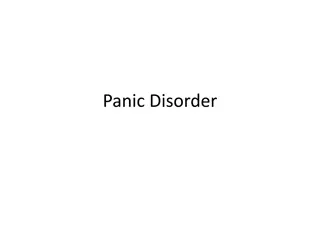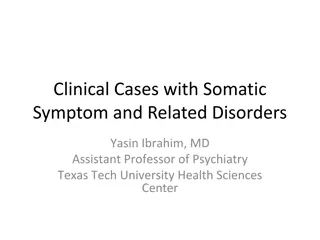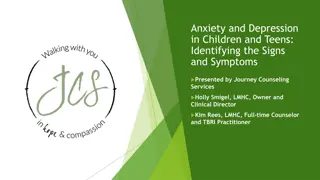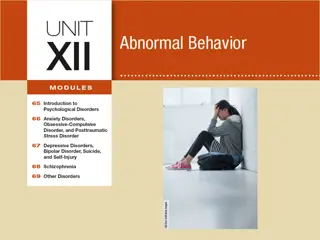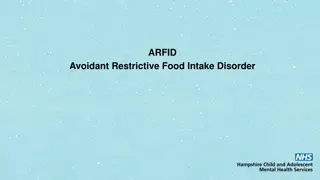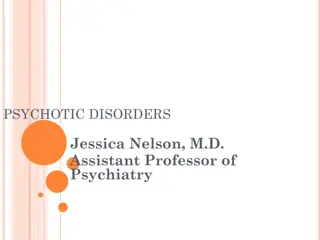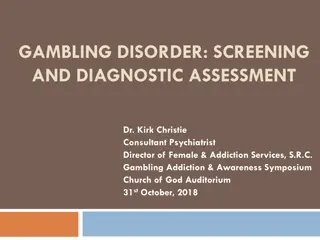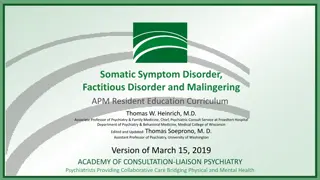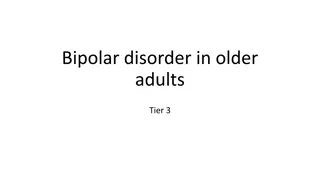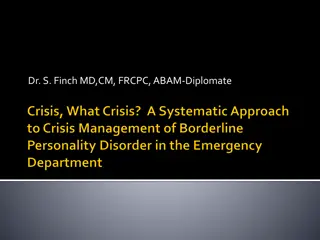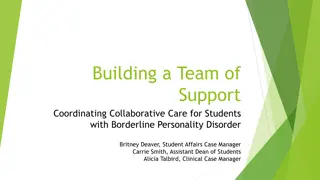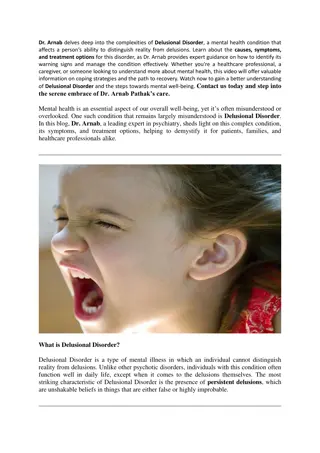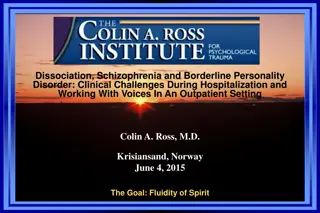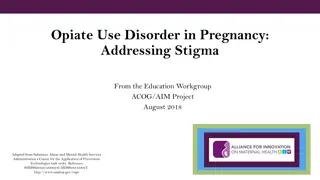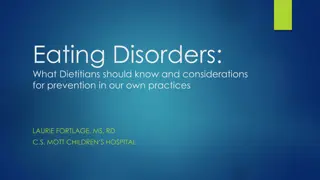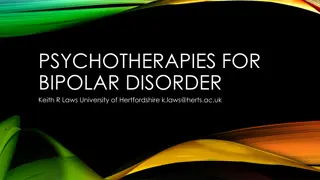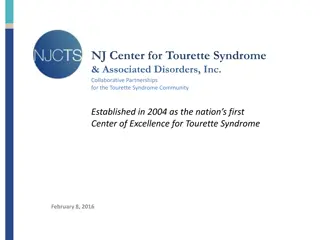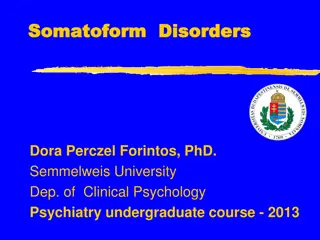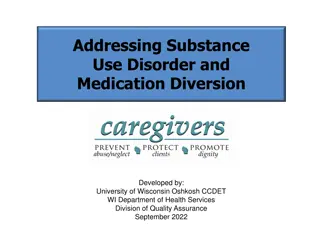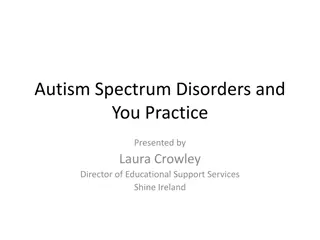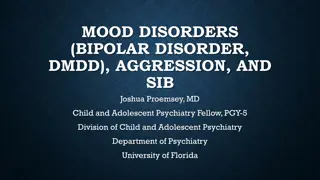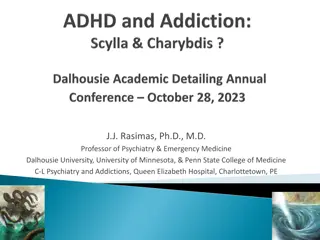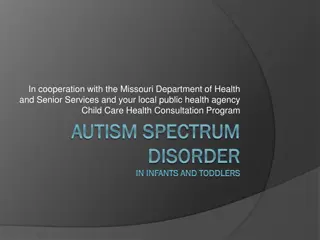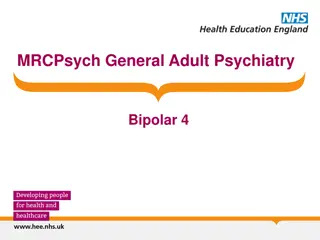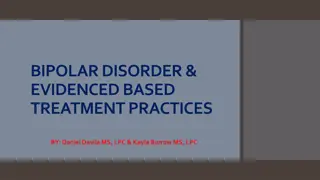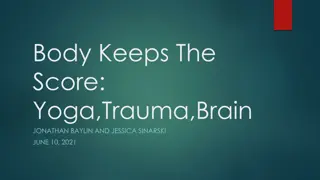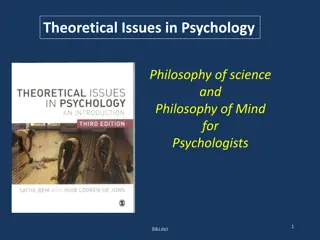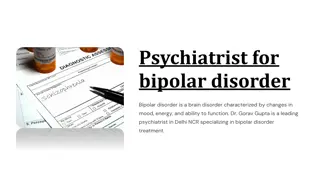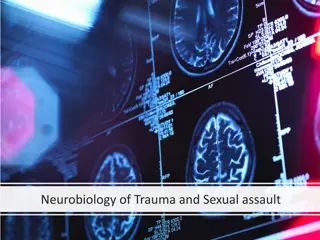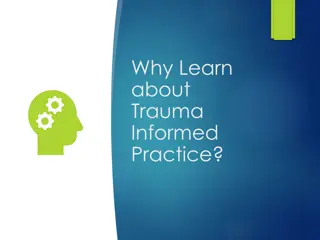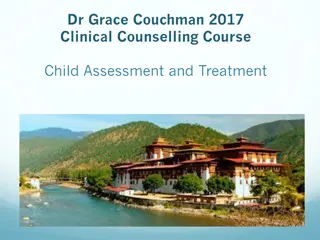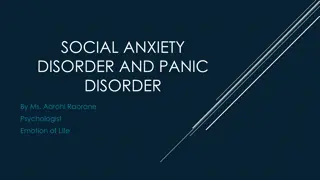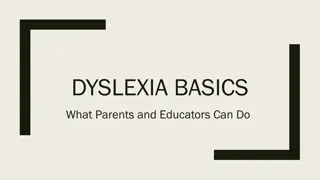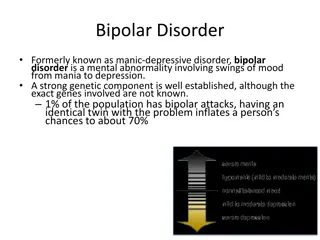Approach to Depression in Primary Care by Dr. Jon Davine
In this presentation, Dr. Jon Davine discusses the approach to depression in primary care, covering topics such as differential diagnosis, antidepressant medication selection, augmentation techniques, and treatment options like ECT and TMS. The sad state is explored through differential diagnoses, i
5 views • 56 slides
Understanding Panic Disorder: Symptoms, Diagnosis, and Management
Panic disorder is characterized by sudden, intense surges of fear or discomfort known as panic attacks. Individuals with this disorder may experience symptoms like chest pain, shortness of breath, dizziness, and a fear of having a heart attack. Differential diagnosis includes conditions like coronar
0 views • 8 slides
Understanding Anxiety Disorders and Related Conditions
Explore the distinguishing features of anxiety disorders such as generalized anxiety disorder, panic disorder, and phobias, along with insights into obsessive-compulsive disorder (OCD) and posttraumatic stress disorder (PTSD). Delve into the impact of conditioning, cognition, and biology on these co
2 views • 46 slides
Complex Case Study: Chronic Pain and Somatic Symptom Disorder
Michelle Adams, a 51-year-old hairdresser, presents with severe chronic back pain following a traumatic incident. Despite various treatments and medications, her pain persists, leading to distress and functional impairment. Her symptoms align with Somatic Symptom Disorder (SSD) with predominant pain
0 views • 50 slides
Understanding Anxiety and Depression in Children and Teens
This presentation by Journey Counseling Services delves into identifying signs and symptoms of anxiety and depression in children and teens. Topics include the different components of anxiety, common signs and symptoms, and various types of anxieties such as phobias, separation anxiety, generalized
1 views • 11 slides
Understanding Depressive Disorders and Bipolar Disorder
Depression is prevalent among students and individuals in the US. Major depressive disorder and persistent depressive disorder are characterized by varying degrees of depressive symptoms lasting for different durations. The diagnostic criteria include signs of depression persisting for specific peri
0 views • 57 slides
Understanding ARFID: A Guide to Avoidant Restrictive Food Intake Disorder
Avoidant Restrictive Food Intake Disorder (ARFID) is a feeding and eating disorder characterized by significant weight loss, nutritional deficiency, and psychosocial impairment. Individuals may experience sensory sensitivity, lack of interest, or fear of aversive consequences. ARFID differs from pic
0 views • 18 slides
Understanding Psychotic Disorders: Insights from Schizophrenia
Explore the diagnostic criteria, neurobiological factors, and differential diagnoses of psychotic disorders, focusing on Schizophrenia. Delve into the history, epidemiology, and key characteristics of Schizophrenia to gain a comprehensive understanding of this complex mental health condition.
2 views • 107 slides
Understanding Gambling Disorder: Screening and Diagnostic Assessment
Dr. Kirk Christie, a Consultant Psychiatrist, delves into the world of gambling disorder, exploring definitions, neurobiology of addiction, screening instruments, DSM-V criteria, and harmful alcohol usage. Discover the differences between nondisordered, social, and problematic gambling behaviors, al
0 views • 27 slides
Understanding Somatic Symptom Disorder and Related Disorders
This educational material delves into Somatic Symptom Disorder, Factitious Disorder, and Malingering, emphasizing the importance of accurate diagnosis and management. It explores various aspects, including symptoms, classifications, and implications in bridging physical and mental health. The conten
0 views • 91 slides
Understanding Bipolar Disorder in Older Adults
Bipolar disorder in older adults can have a later onset, often after the age of 50, with episodes of mania and depression. Recognizing symptoms like excessive energy, inability to sleep, and cognitive impairment is crucial. Late-onset bipolar disorder differs from early-onset in familial illness rat
1 views • 12 slides
Understanding Borderline Personality Disorder (BPD) Crisis Presentations
Borderline Personality Disorder (BPD) is a common and challenging disorder, especially in clinical populations. With prevalence varying from 1-2% in the general population to up to 25% in agitated emergency patients, BPD often presents in crisis situations, leading to suicidal behavior and frequent
1 views • 41 slides
Effective Strategies for Children with Developmental Language Disorder, Sensory Processing Disorder, and Fine Motor Delays
Children with Developmental Language Disorder (DLD), Sensory Processing Disorder (SPD), and Fine Motor Delays often have accompanying sensory and fine motor deficits. Research indicates that addressing sensory processing deficits can significantly benefit children with DLD, ADHD, autism, and other d
0 views • 61 slides
Building a Team of Support for Students with Borderline Personality Disorder
Creating a collaborative care team is essential in supporting students with Borderline Personality Disorder (BPD). This involves understanding the clinical and nonclinical contexts surrounding BPD, such as the prevalence of the disorder, common symptoms, and challenges faced by individuals. The team
0 views • 13 slides
Delusional Disorder Explained by Dr. Arnab Causes Symptoms & Treatment
Dr. Arnab delves deep into the complexities of Delusional Disorder, a mental health condition that affects a person\u2019s ability to distinguish reality from delusions. Learn about the causes, symptoms, and treatment options for this disorder, as Dr
0 views • 4 slides
Understanding Schizophrenia, Dissociation, and Borderline Personality Disorder
Clinical challenges and treatment approaches for schizophrenia, dissociative identity disorder, and borderline personality disorder are discussed in this content. The genetic and environmental factors influencing these conditions are explored, along with insights from twin studies and treatment effi
0 views • 23 slides
Understanding Stigma in Opioid Use Disorder During Pregnancy
Stigma plays a detrimental role in Opioid Use Disorder (OUD) during pregnancy, leading to fear of judgment and hindering individuals from seeking help. This stigma can result in dropping out of treatment programs and societal exclusion. Substance use disorder, including OUD, is highly stigmatized, a
0 views • 24 slides
Understanding Eating Disorders: Insights for Dietitians
Eating disorders are complex neurobiological conditions that are not merely about control or weight management. These disorders can affect individuals of all genders, body sizes, and socioeconomic backgrounds. Dietitians play a crucial role in identifying, assessing, and treating eating disorders, a
0 views • 41 slides
Psychotherapies for Bipolar Disorder - Evidence-Based Interventions
This content discusses psychotherapies for bipolar disorder, including managing bipolar depression and evidence-based manuals. It emphasizes the importance of psychological interventions tailored for bipolar disorder to effectively reduce relapse and manage symptoms. The content also highlights the
0 views • 9 slides
Understanding Tourette Syndrome: Facts and Implications
Tourette Syndrome (TS) is a neurobiological disorder characterized by uncontrollable vocal and physical tics. Despite being underrepresented, it affects around 1 in 100 individuals. TS often goes undiagnosed, leading to misunderstanding and misrepresentation. The NJ Center for Tourette Syndrome prov
0 views • 13 slides
Understanding Somatoform Disorders: Symptoms, Diagnosis, and Treatment Options
Somatoform disorders are characterized by physical symptoms that mimic general medical conditions without an underlying medical or mental disorder. Patients often exhibit somatic symptoms without an organic basis, have poor insight, and do not find reassurance helpful. Common types include somatizat
0 views • 46 slides
Understanding Substance Use Disorder and Medication Diversion
Substance use disorder (SUD) can affect anyone regardless of age, occupation, or background. This training module covers the identification of SUD, best practices for prevention, and the impact of opioid use disorder. It emphasizes the importance of recognizing medication diversion and provides insi
0 views • 19 slides
Understanding Autism Spectrum Disorders: Signs, Symptoms, and Support
Autism is a neurobiological disorder affecting social interaction, communication, and behaviors. Signs and symptoms vary across different age groups, from infants to older children, highlighting difficulties in social connection, communication, and speech. Early detection is crucial for intervention
0 views • 12 slides
Understanding Bipolar Disorder in Children and Adolescents
Bipolar disorder in young individuals is characterized by mood swings between manic and depressive states, with various subtypes such as Bipolar I, Bipolar II, and Cyclothymia. Clinical characteristics include hypomania and mania, which present with distinct symptoms such as elevated mood, increased
0 views • 35 slides
Understanding the Complex Relationship between ADHD and Addictions
Appreciate the intricate evolution of Attention Deficit Hyperactivity Disorder (ADHD) in relation to addictions. Explore clinically relevant science and care management principles for managing co-occurring ADHD and substance use. ADHD and addictions are clinical diagnoses with no definitive tests, h
0 views • 31 slides
Understanding Autism Spectrum Disorder in Infants and Toddlers
Autism Spectrum Disorder (ASD) is a developmental disability that presents challenges in social interaction, communication, and behavior. Individuals with ASD may exhibit a range of abilities from gifted to severely challenged. It is now considered a single diagnosis encompassing conditions like Aut
0 views • 36 slides
Understanding Prosocial Behavior and Well-Being: An Evolutionary Perspective
Exploring the concepts of prosocial behavior, altruism, and well-being from an evolutionary standpoint, this content delves into the roots of these behaviors, genetic influences, and neurobiological structures associated with them. It also discusses ways to increase well-being using different approa
0 views • 30 slides
Understanding Bipolar Disorder: Course, Prognosis, and Treatment
Develop a comprehensive understanding of Bipolar disorder, including its course, prognosis, and risk factors for poor outcomes. Explore the prevalence, time course, and intensity of the disorder, as well as different types and changes in presentation over time. Gain insights from expert-led sessions
0 views • 29 slides
Understanding Bipolar Disorder and Evidence-Based Treatment Practices
This presentation by Daniel Davila, MS, LPC, and Kayla Burrow, MS, LPC delves into the complexities of bipolar disorder, potential crisis outcomes, and mental illness management through evidenced-based treatment practices. Topics covered include bipolar diagnosis, assessing disorder lethality, treat
0 views • 44 slides
Enhancing Emergency Medicine Training for Opioid Use Disorder
The research focuses on improving Emergency Medicine residency training regarding Opioid Use Disorder (OUD) treatment, particularly with Medications for Opioid Use Disorder (MOUD). It highlights the need for increased education and implementation of evidence-based practices such as naloxone and bupr
0 views • 13 slides
The Transformative Power of Yoga in Healing Trauma and Reclaiming Agency
Explore the profound impact of yoga on trauma healing, brain regulation, and reclaiming one's sense of agency. Delve into the neurobiological effects of chronic stress and the therapeutic potential of yoga in restoring balance and reconnecting with oneself and others. Discover how yoga facilitates s
0 views • 9 slides
Exploring Theoretical Issues in Psychology: Consciousness, Qualia, and Free Will
Delve into the complexities of consciousness, qualia, and free will in the realm of psychology, examining topics such as phenomenal experiences, naturalistic vs. mentalistic views, and the neurobiological perspective on emotions and self-consciousness.
0 views • 14 slides
Psychiatrist for bipolar disorder
Bipolar Disorder is a brain disorder characterized by extreme mood changes; manic or hypomanic episodes and mixed episodes with depressive episodes. In the following blog post, the best psychiatrist for bipolar disorder treatment, Dr. Gorav Gupta, el
0 views • 7 slides
Understanding Trauma and Its Effects on the Brain
Trauma is not just an event but a response that overwhelms individuals physically and psychologically. The neurobiological impact of trauma, such as alterations in physiology, cognition, and memory, can be profound. This content delves into how traumatic experiences can affect brain functions, speci
0 views • 16 slides
Understanding Trauma: Key Elements and Neurobiological Impact
Trauma-informed practice involves being aware of trauma's presence, understanding its effects on physical and emotional well-being, and working with trauma symptoms constructively. Trauma can arise from direct exposure, witnessing, or indirect experiences, affecting memory encoding and retrieval. Th
0 views • 23 slides
Clinical Counselling and Treatment of Child Disorders: Assessment and Interventions
The Clinical Counselling Course by Dr. Grace Couchman in 2017 focuses on child assessment and treatment, covering various disorders such as depression, anxiety, behavior disorders, learning difficulties, autism spectrum disorders, and more. The course emphasizes tools for clinical assessment and cou
0 views • 14 slides
Understanding Headache: Causes, Classification, and Prevalence
Headache is a prevalent symptom with various causes, including migraines, tension-type headaches, and cluster headaches. The International Headache Society's classification helps distinguish primary and secondary headache disorders, guiding necessary referrals. Headaches affect a significant portion
0 views • 30 slides
Understanding Social Anxiety Disorder and Panic Disorder
Social anxiety disorder and panic disorder are common mental health conditions characterized by intense feelings of fear and anxiety in social situations. Individuals with these disorders may experience physical symptoms such as trembling, racing heart, and upset stomach, along with emotional signs
0 views • 18 slides
Understanding Dyslexia: What Parents and Educators Can Do
Dyslexia is a specific learning disability of neurobiological origin, characterized by difficulties in word recognition, spelling, and decoding. It stems from a deficit in the phonological component of language, impacting reading comprehension and vocabulary growth. Proper support and effective clas
0 views • 21 slides
Understanding Mental Health Disorders: Bipolar Disorder, Anxiety Disorders, & More
Exploring various mental health disorders such as Bipolar Disorder, Anxiety Disorders, Generalized Anxiety Disorder, Panic Disorder, and Phobic Disorders. Learn about their symptoms, prevalence, and impacts on individuals' lives.
0 views • 41 slides

